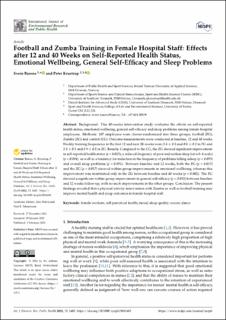Football and Zumba Training in Female Hospital Staff: Effects after 12 and 40 Weeks on Self-Reported Health Status, Emotional Wellbeing, General Self-Efficacy and Sleep Problems
Peer reviewed, Journal article
Published version
Permanent lenke
https://hdl.handle.net/11250/3052296Utgivelsesdato
2022Metadata
Vis full innførselSamlinger
Originalversjon
International Journal of Environmental Research and Public Health (IJERPH). 2022, 19 (3), 1685-?. 10.3390/ijerph19031685Sammendrag
Background: This 40-weeks intervention study evaluates the effects on self-reported health status, emotional wellbeing, general self-efficacy and sleep problems among female hospital employees. Methods: 107 employees were cluster-randomized into three groups; football (FG), Zumba (ZG) and control (CG). Outcome measurements were conducted at baseline, 12 and 40 weeks. Weekly training frequencies in the first 12 and next 28 weeks were 2.4 ± 0.3 and 0.8 ± 0.2 in FG and 2.3 ± 0.3 and 0.9 ± 0.2 in ZG. Results: Compared to the CG, the ZG showed significant improvement in self-reported health status (p = 0.025), a reduced frequency of poor and restless sleep (on a 0–4 scale) (p = 0.004), as well as a tendency for reduction in the frequency of problems falling asleep (p = 0.055) and overall sleep problems (p = 0.051). Between baseline and 12 weeks, both the FG (p = 0.017) and the ZG (p = 0.017) showed within-group improvements in emotional wellbeing, whereas this improvement was maintained only in the ZG between baseline and 40 weeks (p = 0.002). The FG showed a significant within-group improvement in general self-efficacy (p = 0.012) between baseline and 12 weeks follow-up, with no such improvements in the other groups. Conclusion: The present findings revealed that a physical activity intervention with Zumba as well as football training may improve mental health and sleep outcomes in female hospital staff.

